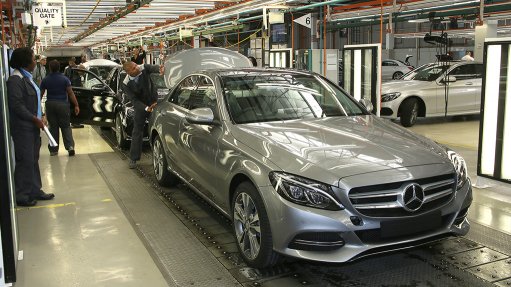
The first new C-Class has rolled off the production line at the Mercedes-Benz South Africa (MBSA) East London plant, in the Eastern Cape.
Exports to around 80 markets are scheduled to start at the end of the second quarter.
Between 80% and 85% of production will be exported.
Production of the new vehicle, in left-hand- and right-hand-drive derivatives, has seen capacity at the plant increase from roughly 50 000 C-Class units a year, to around 100 000 units a year.
Investment by MBSA and its Daimler parent company to produce the new C-Class amounted to R5.4-billion, said Trade and Industry Minister Dr Rob Davies on Thursday, speaking in East London.
Component manufacturers had invested an additional R2-billion.
Ten new multinational component suppliers had set up shop in South Africa to enable production of the new C-Class, set to compete in the South African premium car market from the end of May.
Around 800 new jobs had been created in the MBSA value chain.
MBSA CEO and manufacturing VP Arno van der Merwe noted that the local arm of the German manufacturer would move to a third assembly shift “in the next few weeks”.
Mercedes-Benz Cars divisional board member Markus Shäfer said MBSA had cut the time to produce a C-Class in East London by 30%, from 2008 to 2013. He also highlighted the many accolades the plant had won globally for the quality vehicles it produces.
“The opportunity to build the C-Class was clearly earned.”
The mid-size luxury C-Class is Mercedes-Benz’s highest volume seller globally.
There are four plants that produce the new C-Class, with one operation each in the US, China, South Africa and Germany.
Shäfer noted on Thursday that the teamwork and team spirit evident at the MBSA plant served as a positive for the Daimler group, with one area of possible concern the skills level of the South African workforce.
He said the level of technology found in the new generation vehicles “was going up tremendously”. He said it is important to “keep up” with the necessary training to improve skills levels, adding that it was “key for the country to work on its education system”, and to catch up on a continuously “moving target”.
Van der Merwe added that efficiency improvements and embracing new technology “were critical” to the sustained future of the South African motor industry.
He said the challenge of skills upliftment to sustain new technologies was high on MBSA’s agenda.
MBSA spent around R60-million on skills training to enable the production of the new C-Class.
APDP HERE TO STAY
Minister Davies on Thursday emphasised that government’s Automotive Production Development Programme (APDP) was here to stay”.
The APDP, scheduled to end in 2020, was currently the subject of an industry review.
Davies hinted strongly that the APDP should continue up to, and even beyond 2020, saying that “we could take it for granted that there would be future consultations” on the programme, adding that “anyone in a decision-making position” would be able to see the benefits of the programme.
He said South Africa’s automotive industry was central to government’s efforts to “industrialise and re-industrialise” South Africa.
Davies’ position as Minister was uncertain until the new President announced his or her Cabinet, following the May 7 elections.
Davies noted that the Automotive Investment Scheme (AIS), a component of the APDP, had, since 2009, supported R22.5-billion in investments from the South African automotive industry, creating 9 756 jobs.
MBSA’s new C-Class project has received R1.6-billion in government support, the “biggest single investment by the AIS”, said Davies.